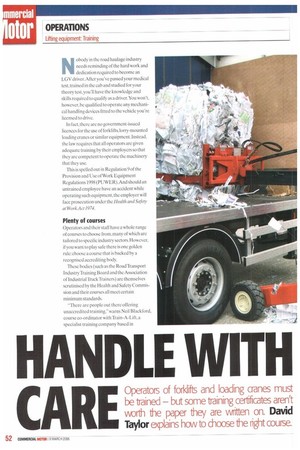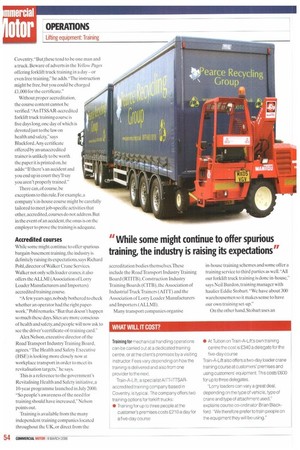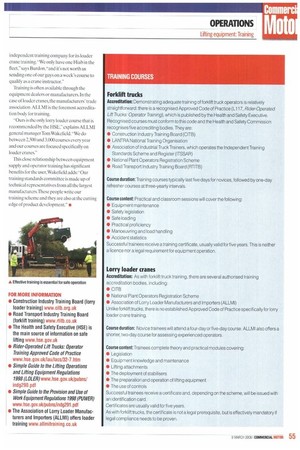HANDLE 1111 Till 1
Page 52

Page 54

Page 55

If you've noticed an error in this article please click here to report it so we can fix it.
Operators of forkifts and loading cranes must
be trained — but some -training certificates aren't worth the paper they are written on. David Taylor explains how to choose the right course. Nobody in the road haulage industry needs reminding of the hard work and dedication required to become an LGV driver. After you've passed your medical test, trained in the cab and studied for your theory test, you'll have the knowledge and skills required to qualify as a driver. You won't, however, be qualified to operate any mechanical handling devices fitted to the vehicle you're licensed to drive.
In fact, there are no government-issued licences for the use of forklifts, lorry-mounted loading cranes or similar equipment. Instead. the law requires that all operators are given adequate training by their employers so that they are competent to operate the machinery that they use.
This is spelled out in Regulation 9 of the Provision and Use of Work Equipment Regulations 1998 (PUWER).And should an untrained employee have an accident while operating such equipment, the employer will face prosecution under the health and Safety' at Work Act 1974.
Plenty of courses
Operators and their staff have a whole range of courses to choose from, many of which are tailored to specific industry sectors. However. if you want to play safe there is one golden rule: choose a course that is backed by a recognised accrediting body These bodies (such as the Road Transport Industry Training Board and the Association of Industrial Truck Trainers) are themselves scrutinised by the Health and Safety Commission and their courses all meet certain minimum standards.
"There are people out there offering unaccredited training," warns Neil Blackford, course co-ordinator with Train-A-Lift, a specialist training company based in Coventry."Butythese tend to be one man and a truck. Beware of adverts in the Yellow Pages offering forklift truck training in a day — or even free training," he adds.-The instruction might be free, but you could be charged £1,000 for the certificate."
Without proper accreditation, the course content cannot be verified. "An ITSSAR-accredited forklift truck training course is five days long, one day of which is devoted just to the law on health and safety," says Blackford. Any certificate offered by an unaccredited trainer is unlikely to be worth the paper it is printed on, he adds:"If there's an accident and you end up in court they'll say you aren't properly trained."
There can, of course, be exceptions to this rule. For example, a company's in-house course might be carefully tailored to meet job-specific activities that other, accredited, courses do not address. But in the event of an accident, the onus is on the employer to prove the training is adequate.
Accredited courses
While some might continue to offer spurious bargain-basement training, the industry is definitely raising its expectations, says Richard Pohl, director of Walker Crane Services. Walker not only sells loader cranes, it also offers the ALLMI (Association of Lorry Loader Manufacturers and Importers) accredited training course.
"A few years ago, nobody bothered to check whether an operator had the right paperwork," Pohl remarks:Tut that doesn't happen so much these days. Sites are more conscious of health and safety.and people will now ask to see the driver's certificate-of-training card."
Alex Nelson, executive director of the Road Transport Industry Training Board, agrees. "The Health and Safety Executive (HSE) is looking more closely now at workplace transport in order to meet its revitalisation targets,he says.
This is a reference to the government's Revitalising Health and Safety initiative, a 10-year programme launched in July 2000. "So people's awareness of the need for training should have increased," Nelson points out.
Training is available from the many independent training companies located throughout the UK, or direct from the independent training company for its loader crane training."We only have one Hiab in the fleet," says Burdon,"and it's not worth us sending one of our guys on a week's course to qualify as a crane instructor."
Training is often available through the equipment dealers or manufacturers. In the case of loader cranes,the manufacturers' trade association ALLMI is the foremost accreditation body for training.
"Ours is the only lorry loader course that is recommended by the HSE," explains ALLMI general manager Tom Wakefield. "We do between 2,500 and 3,000 courses every year and our courses are focused specifically on loader cranes."
This close relationship between equipment supply and operator training has significant benefits for the user, Wakefield adds:-Our training standards committee is made up of technical representatives from all the largest manufacturers.These people write our training scheme and they are also at the cutting edge of product development.
































































































































































































